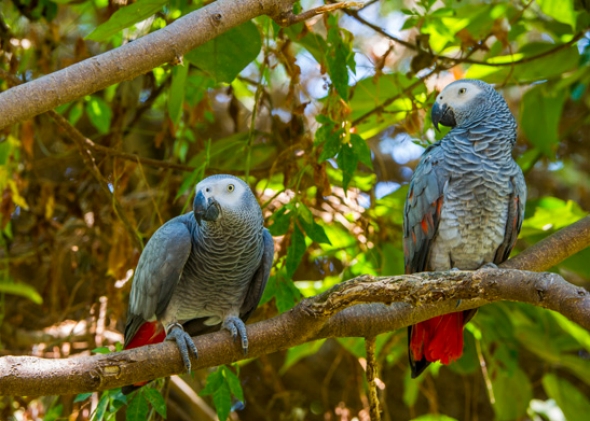Just this once, a good-news story “in the fight against wildlife trafficking”: “The World’s Smartest Birds, Set Free,” by Charles Bergman, writing at Slate.com.
Libertarians know too well that legislation tends to have unintended consequences. For example, a prohibition on trade and trafficking in these sentient creatures has meant that their main predator—man—has proceeded to decimate the bird population’s habitat. For when the birds can’t be harvested, the supporting ecosystem loses its commercial value too. It’s an unending, heartbreaking quagmire.
Or, do we accept that some values are uniquely Western—like the worldview that wild life has its own intrinsic value independent of man? And if so, what is to be done about the kind of cruelty we in the West cannot abide? Clearly education is invaluable. Can demand be reduced through education? Markets for these magnificent, social creatures are, after all, fueled by demand.
… African Grey parrots are among the most heavily traded of all animals. Their popularity is fueled by recent research on their astonishing intelligence. In some ways, their cognitive abilities rival those of a 3-year-old child. Alex, the “genius” African Grey parrot studied by Irene Pepperberg, had a vocabulary of more than 100 words and a sassy tongue—a smart Alex.
They may be the smartest birds in the world.
According to Rowan Martin, the energetic ornithologist who managed our release of the parrots, about 2 million African Grey parrots have been captured from the wild for the global pet trade since 1975.
This figure is staggering. Most of the parrots were captured as part of a thriving legal trade in wild-caught parrots. It seems counterintuitive …

UPDATE I (11/15): FACEBOOK THREAD:
“This is the paradox of parrots. We love them for being like us, for talking like us, and for bonding with us. But then we find ourselves unprepared for the challenges they present in our busy lives.” Another important, poignant piece by Dr. Charles Bergmen: “No-Fly Zone: Denied Their Natural Habits, Millions of Pet Parrots Lead Bleak, Lonely Lives.”
UPDATE II: As to John Paterson’s assertion that, “If you’re going to own a bird, you should always own two”:
Not so. Mark Anderson’s reply is the correct one. Anderson writes: “I love birds. It’s not necessary to own two as long as you give your bird attention. In fact, birds tend to be one person kind of spirits. My bird didn’t like to see anybody but me.”
Indeed. I work from home and can give my parrot what he needs. Provided you make the effort, parrots can fall deeply in love with their companion human, so much so as to regard him or her as a mate for life. This is how intense they are. So long as he is hugged, kissed, praised (OW actually displays his wing feathers each time I call him a “beautiful poi.” He can tell from the tone of my voice that I am admiring him), and respected. They must be let loose to fly in the house (the home must be safe), and they must seldom be caged. Like a 2-year-old child, OW is only sent to his room (caged) at bedtime, when his parronts go out, when he needs some quite, alone time. Thus, he puts himself to bed and goes in-and-out of his house at will, b/c it is no longer a prison cell. His cage is simply real estate he owns. One of many. The sacrifices are enormous. And we were unable to keep our other parrot, given the confines of our home and the stressors of work. That sadness over relinquishing a parrot never leaves me (ditto my husband).
UPDATE III (11/17): My husband corrected me, as to the above. Yes, to raise a parrot in an ideal way takes sacrifice. Not everyone can do it. Therefore, it is wrong to set unrealistic benchmarks. It takes a few years to bond with and gain the complete trust of these brilliant little individuals. While you are doing so, you will need probably to keep the parrot’s wing feathers clipped. If you work long hours, your bird will be caged, but make sure that you bring him into the family fold when you get home and let him loose then to bond and receive love from his flock. He may want one-on-one, as our parrot does with my husband when he gets home. That he must have. So, adopt discarded parrots, and work to bond with them, only through kindness and rewards. Never punish a parrot. They learn to hate. They will tolerate nothing but persuasion and calm, reasonable conduct. Walk away if parrot is being naughty. Once you bond with the animal, you can then cultivate flight. The other thing Sean mentioned is this: Provided you can cope, two parrots that like each other and can hang out is a good thing. If they don’t like each other—and in their affinities they are just like human beings—then more than one parrot will not enhance the two’s existence.


 print
print